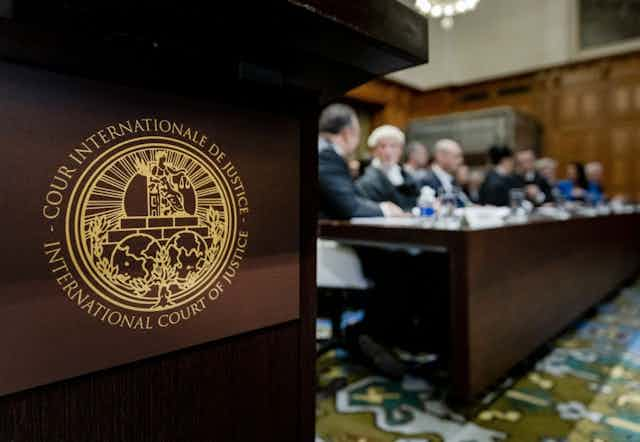In November 2023, six western states filed a joint application before the International Court of Justice (ICJ) arguing for an ample and expansive understanding of genocide. This intervention, as it is legally termed, was made by Canada, Denmark, France, Germany, the Netherlands and the UK in relation to the genocide case The Gambia filed against Myanmar in 2019. The still on-going case revolves around the violent expulsion of Rohingya people from Myanmar into Bangladesh.
Our research focus is on international law and transitional justice. Our view is that the intervention is interesting and significant, both because of how it interprets past genocide cases, and in terms of what this could mean for the ICJ’s future determinations regarding states’ commission of genocide.
Consolidating genocide law
Genocide concerns the destruction of a people. It is called “the crime of crimes” because of its collective significance; it diminishes our humanity. The Genocide Convention, which grew out of the horrors of the Holocaust, was introduced in 1948 and has since been joined by 153 states. Its definition of genocide requires the demonstration of an intent to destroy a group in whole or in part. The Genocide Convention addresses states, which can either carry out or refrain from genocidal policies. It was designed to prevent genocide and should be forward-looking.
The ICJ, which hears claims between states, has only decided two genocide cases to date, and has never held a state responsible for genocide. This has contributed to discussions of the Genocide Convention as a “failure”.
While the ICJ’s record is sparse, there are many genocide findings produced by international criminal courts in cases against individuals. For example, the Akayesu case before the International Tribunal for Rwanda found a Rwandan major guilty of genocide in relation to sexual violence. And the International Tribunal for the Former Yugoslavia found several individuals guilty of genocide in relation to the 1995 massacre of 8,000 Bosnian men and boys at Srebrenica.
This law is developed not under the Genocide Convention but rather through international criminal law. International criminal courts have produced far-reaching and inclusive definitions of the kinds of violent crime that can constitute genocide. This is the jurisprudence that the joint intervention consolidates to argue for a more expansive construction of genocide than the ICJ has so far employed.
The joint intervention makes three key interpretive points. First, genocide concerns “destruction”, which need not be death. Indeed, the Genocide Convention itself recognises that killing is not a necessary aspect of genocide and that other forms of violence may also be genocidal.
Second, the joint intervention examines how sexual and gender-based crime can contribute to a finding of genocide. It connects these crimes both to the intent standard in the crime of genocide, as well as to the group destruction standard.
Read more: Genocide: 70 years on, three reasons why the UN Convention is still failing
Finally, the joint intervention argues that the threshold for how genocide is constituted should be lowered when considering crimes against children. These crimes affect an individual for the rest of their life, defining entire generations. It also matters that children are more vulnerable than adults, and therefore easier to harm or to kill. The joint intervention reasons:
Given the significance of children to the survival of all groups, evidence of harm to children may contribute to an inference that the perpetrators intended to destroy a substantial part of the protected group.
In legal terms, the joint intervention is progressive because it draws from existing case law to show patterns in how genocide can be established. These legal conversations are part of how jurisprudence develops and can be integral to judicial decision making. In political terms, the joint intervention is enterprising because it may lock the six states into a more ample understanding of genocide. This is because one of the characteristics that distinguish law from politics is its relative stability of meaning.
Therefore the joint intervention suggests ways the ICJ can apply genocide jurisprudence to better realise the Genocide Convention’s forward-looking mandate.
Significance beyond The Gambia v Myanmar
The Genocide Convention makes all states that are parties to it responsible for the prevention of genocide anywhere in the world. Before The Gambia’s 2019 case against Myanmar, however, this “erga omnes” jurisdictional mandate had never been realised. The Gambia’s case against Myanmar is the first time that the Genocide Convention has been raised not by states in conflict with each other, but rather between two unrelated states. The alleged genocide does not target The Gambia or its citizens.
The collective responsibility signalled by erga omnes jurisdiction is why the six states were allowed to intervene in The Gambia v Myanmar. This is also why South Africa, in its recent case against Israel alleging genocide in Gaza, characterised its actions as “seeking interim measures against itself as well as against Israel”.
So far, the six states who submitted the joint intervention in The Gambia case have not expressed support for South Africa in its case against Israel. Regardless of what they do or don’t say regarding South Africa’s case, however, their November 2023 intervention in The Gambia v Myanmar speaks for them.

